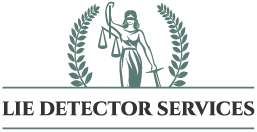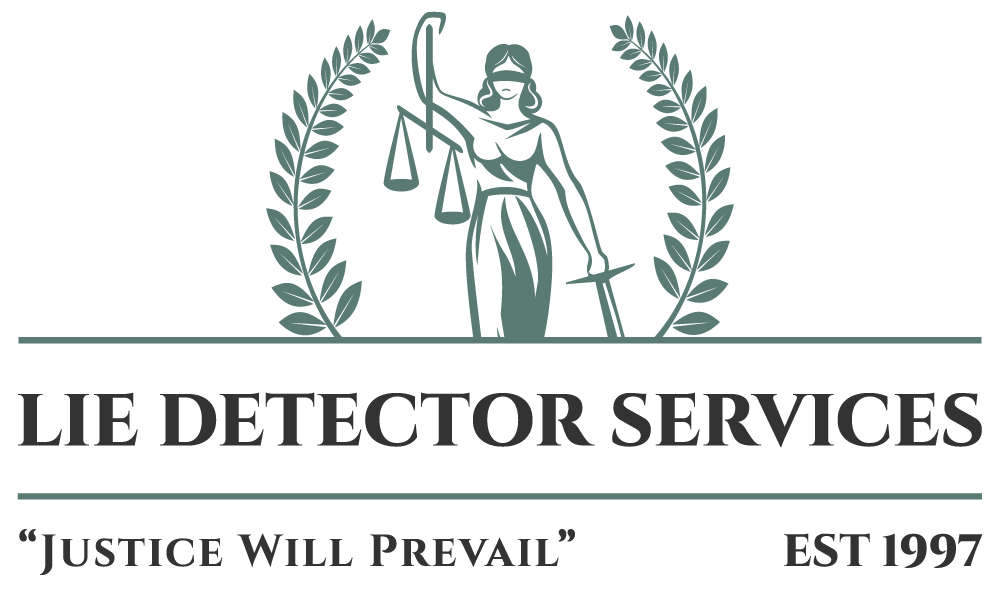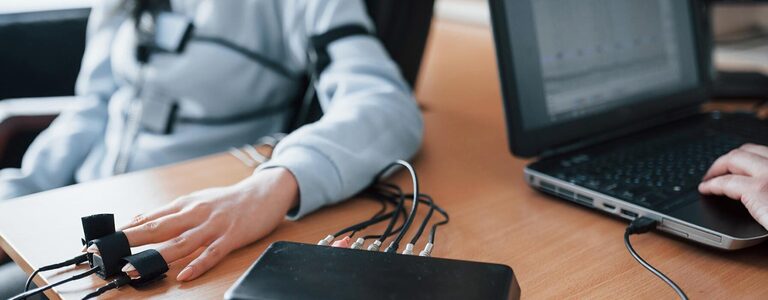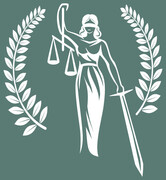Derived from the Greek language, the word “polygraph” means “many writings”. It refers to the manner in which selected physiological activities are continuously and simultaneously recorded. The polygraph instrument is often referred to as a “lie detector”.
A polygraph is a diagnostic instrument used by a formally trained polygraph examiner for the purpose of collecting, measuring, and recording selected physiological data obtained from an examinee as he or she answers a series of questions relating to a specific issue — whether criminal, civil, or private — during a polygraph examination. This data will then be analyzed and evaluated for psychophysiological credibility assessment.
Polygraph examinations are used in more than 50 countries by government organizations worldwide, law enforcement agencies, private security firms, the legal community, the corporate sector, and private citizens.
The development of medical-grade instrumentation and software has allowed for computerised polygraphs to record physiological responses directly to a software program and display this data on a computer monitor.
During a polygraph examination, the polygraph instrument detects, measures, and records physiological data obtained from three major systems in the human body, all of which are controlled by the Autonomic Nervous System:
1) Respiratory System: Respiratory activity patterns and changes
2) Cardiovascular System: Heart rate, relative blood pressure, blood volume
3) Electrodermal System: Galvanic skin response, i.e. sweat gland activity
All dedicated examiners should strive to give their client the best possible opportunity to have the most accurate polygraph test.
- 1. Neutral venue
- 2. No outside interference from:
- a. Employers
- b. Partners
- c. Children needing attention
- d. Babies and children crying works on emotional stimuli of the examinee
- e. Alarms going off
- f. Outside noises creates additional stimuli on the examinee. This can cause them to react to questions that they should not have any reactions to if they tell the truth
- g. Dogs barking or whimpering to get their owners’ attention. Dogs barking or running around in the house trying to console owners that they can feel experiencing an additional stress load
- h. Partners moving around on the top floor with sound effects coming through the ceiling of someone pacing up and down. Husbands / Partners / Employers waiting outside the door ready to pounce as soon as the examiner finishes the test
- i. Interferences from neighbours shouting or laughing in the street, or on the floor above the area where you think is a good area to take a test
- 3. Feeling safe and secure
- 4. No threat of violence from employer or partner
- 5. Environment plays a major part in passing a polygraph test and if a neutral venue is utilised it improves the results of the lie detector test
The polygraph technique is extremely accurate as there have been studies by doctors and scientists for over 50 years. Most importantly the polygraph is precise when completed by a qualified, credible and experienced examiner. The lie detector test or polygraph examination has gained general acceptance in the scientific fields of psychology and psychophysiology in those areas devoted to credibility assessment. Research conducted by the relevant scientific community, government organizations, and independent universities clearly indicate that a polygraph examination — when properly administered by a formally trained and competent polygraph examiner — has a very high level of accuracy (on average 90 to 95%) in verifying the truth and detecting deception.
According to Dr David C. Raskin, the world-renowned expert and leading scientist in the field of polygraphy, the scientific data concerning the validity of the polygraph can be summarized as follows:
“High quality scientific research from the laboratory and the field converge on the conclusion that a properly conducted CQT (Comparison Question Test) is a highly accurate discriminator of truth tellers and deceivers. The research results converge on an accuracy estimate that exceeds 90 percent.”
According to the American Polygraph Association (APA), 80 research projects, which included both laboratory and field studies, have been conducted and published since 1980 on the validity and reliability of polygraph testing. These projects involved approximately 6,300 polygraph examinations. Of the 23 field studies conducted, the accuracy of polygraph testing was estimated to be 95 percent.
Like any other diagnostic instrument that is used to measure human physiology for the purpose of evaluation and forming professional opinions thereupon, the polygraph instrument is not infallible. The relevant scientific community agrees, however, that polygraph examinations have a very high probative value in distinguishing truthful individuals from deceptive ones, and that no other alternative testing technique for truth verification and lie detection performs better.
Under no circumstances will we assist in any case requesting help in a matter of a criminal / illegal / unethical nature. We have had calls where a client will request for a result to be changed / faked to help them pass due to their current situation they are in. We will not entertain such requests. None of our examiners ever have or will take a bribe or favour a client to 'swing' a result. We have to remain ethical, professional and honest and our reputation is at stake. We will not book any tests where we do not have enough case facts before the time and if we are not comfortable with the facts provided we will not conduct the test. No refunds will be given on such bookings. If any danger is posed to the examinee or the case matter we think could be of an illegal nature (theft, sex, drugs) we will report this to the police. Polygraph tests cannot be used to help in the conducting of a crime. Please do not contact us to assist in such matters.
It is quite normal for an innocent person to feel nervous and the polygraph examiner is fully aware of this. Allow those nerves, they make for better reactions and sometimes a more accurate test result. The examiner is trained how to calibrate and make the examinee acquainted with the process and instrument. An acquaintance test is done as the first chart prior to running anything from 3 - 5 charts around the issue.
A typical example for people to understand is if you are walking down a street at night and you are nervous. Your heart is beating, possibly developing sweat, your breathing is faster. While walking a dog jumps out and barks at you. Immediately you develop one of the 3 F's. Flight / Fight or Freeze. You will react the same in either of those F's. But your heart does beat faster, you do generate more sweat, and your breathing does react suddenly. The examiner records the charts and asks a series of different types of questions and through science and experience, as well as the aid of scoring software he/she will determine if there are lies or truth in the answers.
Yes. You will be informed of the exact wording of each question that will be asked of you during the course of the polygraph examination. There are no "trick" questions.
A polygraph examination takes anything from 1h45 to 2hrs+, however, some may take more or less time, depending on the nature of the issue under investigation. We do not rush the tests and follow strict protocols. We cannot divert from the set international standards.
The examiner will give a detailed explanation of the polygraph procedure, how the polygraph works, and he/she will answer any questions that the examinee may have. The examiner will also take a detailed statement as to the case at hand, then review the questions, run an acquaintance test and then run 3 - 5 charts.
No. The process used is the same no matter what technique is used or how many questions there are. There is a pre test (about 30 mins), in test (about 1hr) and post test phase. The in test phase near the end is the running of the charts. There are multiple questions asked in the technique. Whether you have requested just 1 question or 6, the examiner will have discussed with you how best to formulate various versions of the issue. These are repeated over and over in consecutive charts. We cannot create a quick fix test to ask just 1 question to save on time and cannot ask lists of questions as often thought is the case. There is no validated accurate technique for this and our aim is to provide the most professional and correct results.
No. There are no electric shocks and you will only possibly feel slight discomfort in the blood pressure cuff, but this is just for a very limited time. The examiner will explain this to you in detail before the examination as well as during the procedure.
The polygraph test questions will vary according to the case issue but all questions are specific and pertinent to the issue to be resolved. Questions only require a “yes” or “no” answer and with no explanation or qualification.
Its important to understand that the polygraph is not a miracle magic wand. It cannot be used to ask wrongly phrased questions and multiple bulk questions at once. Hollywood and TV shows often portray the way in which tests are conducted and the style and number of questions asked, in an incorrect way. We use the most accurate techniques available and recommended by the APA. There are techniques asking 2 to 4 relevant questions for single issue matters. For screening and pre-employment we can run up to 6 questions. There are a number of other questions asked at the time all helping in the scoring and baseline. But the total number of relevant questions for your matter is limited. The examiner will explain this to you in detail.
No. No one can be forced to undergo a polygraph test. The test is totally voluntary. To properly administer a polygraph examination, the examiner will need your volunteer assistance by signing a consent form prior to the test. There are few basic instructions which the examinee should follow during the In-test Phase (Chart Collection) as to sit still and not to move needlessly while the examination is in progress. The examiner will also ask you (the examinee) to breathe normally, not to take deep or short breaths, not to hold your breath or to modify it, as all such maneuvers will be detected by the anti-countermeasure sensor and could lead to a termination of the test due to a countermeasure/cheating attempt detection.
Since the examiner requires your full cooperation in this regard, you must voluntarily accept to undergo a polygraph examination.
All polygraph examinations are audio and video recorded for quality and security purposes. This footage is only accessible to the examiner. We do not release any audio or video, as well as polygraph charts to anyone. The report will only be sent in a PDF format on email to the client requesting / paying for the test. The report can also be posted if requested.
No. In order to keep a sterile and confidential environment, no one other than the examiner and examinee can be in the examination room during the procedure. A companion is permitted to be in the room during the pre-test interview but not the test itself. Polygraph is a diagnostic procedure which can be adversely affected by distractions. There have been studies by the American Polygraph Association (APA) to prove that distractions of a second person or witness in room can have negative consequences. No spouse or partner will be allowed in the room or to take any part of the test process (ask the questions) or sit and view in from another area.
Polygraph examinations are used in more than 50 countries such as the USA, South Africa, Spain, Egypt, Israel and Russia. Government organizations, law enforcement agencies, security companies, legal and HR firms, corporates / retails and hospitality, as well as private citizens.
Contrary to some claims and what is read on the internet, drugs or medications will not allow anyone to cheat or beat the test. They also will not affect the test to make you fail or even to pass. An example is that if 3 people walk down a street. One has high blood pressure, one has the flu and one has worked a night shift and is tired. A person jumps out with a knife to try and rob them. The reaction is the same for all 3. All of them will have an increase in heart rate, their blood pressure will get higher, their sweat will develop and their breathing will change. One person does not react differently to the other because of the condition they have. There is an automonic reaction that takes place and this is displayed on the charts which is scored by the examiner.
Yes. There are no studies by the American Polygraph Association (APA) that prove testing a woman whilst pregnant has any negative impact on the result. As we are measuring breathing, perspiration and heart rate. Usually in the late stages of pregnancy, it would be uncomfortable to sit for a long time and also have instruments such as breathing sensors and a blood pressure cuff attached. We always advise that if you are unsure then to consult a doctor before making your booking. You also need to make your own mind up to do the test and sign a consent form. If at any stage a pregnant woman is not feeling well or wants to stop the process this is done with immediate effect.
No and do not attempt this either. Do not rely on what other people may tell you they have heard or seen on TV or read somewhere online. There are websites on the internet that try take your money and claim they can advise you on how to cheat the test. It is generally considered that a guilty person would want to try cheat. In fact you can't cheat the actual test as your reactions from the autonomic nervous system are measured, these you cannot control. These types of examinees do not realise they are not trying to fool the equipment but the examiner. Your examiner is qualified, skilled and has over 20 years experience therefore based on our experience, this is not possible. If you are honest you have nothing to worry about. If the examiner picks up that you are attempting to cheat or distort the test, the process will be stopped immediately and the report will indicate that there was a deliberate attempt to manipulate the test and result outcomes. Our examiners are highly trained on ALL measures used to try trick or cheat a test. The software and instruments used are designed to pick up even the faintest attempt at any cheating. Whether this be by breathing, movements, mental tricks or muscle contractions. If you know you are being deceptive, the polygraph will detect that deception. We use anti countermeasure instruments during the examination which highlight motion detection.




